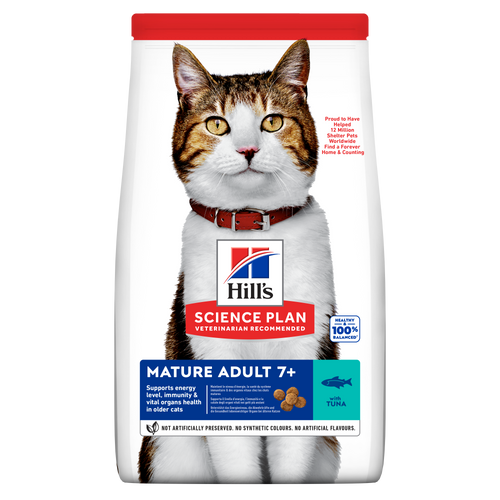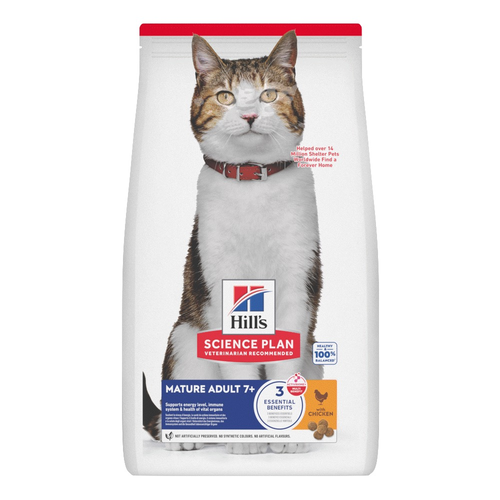
-
Featured products
 Small & Mini Adult Dog Food
Small & Mini Adult Dog FoodHill's Science Plan Small & Mini Breed Adult Dog Food with Lamb & Rice is a complete pet food, specially formulated with ActivBiome+ Multi-Benefit Technology.
Tailored nutrition for the unique needs of small dogs during the prime of their life.Shop Now Small & Mini Mature Adult Dog Food
Small & Mini Mature Adult Dog FoodHill's Science Plan Small & Mini Breed Mature Adult Dog Food with Chicken is a complete pet food, specially formulated with ActivBiome+ Multi-Benefit Technology.
Tailored nutrition to support graceful ageing in small dogs. Specially made with a synergistic blend of nutrients for energy & vigor.Shop Now Small & Mini Puppy Food
Small & Mini Puppy FoodHill's Science Plan Puppy Small & Mini Breed Dog Food with Chicken is a complete pet food, specially formulated with ActivBiome+ Multi-Benefit Technology.
100% balanced nutrition to support optimal growth & the immune system.Shop NowFeatured products Mature Adult 7+ Cat Food
Mature Adult 7+ Cat FoodHill's Science Plan Mature Adult Cat Food with Salmon is a complete pet food, specially formulated with ActivBiome+ Multi-Benefit Technology.
This food supports graceful aging in cats, providing a synergistic ingredient blend to help support energy & activity levels.Shop Now Oral Care Adult Cat Food
Oral Care Adult Cat FoodHill's Science Plan Oral Care Adult Cat Food with Chicken contains clinically proven kibble technology to reduce plaque & tartar build up.
Shop Now Mature Adult Cat Food
Mature Adult Cat FoodHill's Science Plan Mature Adult Cat Food with Chicken is a complete pet food, specially formulated with ActivBiome+ Multi-Benefit Technology.
This food supports graceful aging in cats, providing a synergistic ingredient blend to help support energy & activity levels.Shop Now -
Dog
- Dog Tips & Articles
-
Health Category
- Weight
- Food & Environmental Sensitivities
- Urinary
- Digestive
- Joint
- Kidney
Featured articles Proteins
ProteinsTo make a protein, amino acids are linked together in a long chain. The chain is then bundled into to a three-dimensional structure, like a tangled ball of yarn.
Read More The Right Diet For Your Pet
The Right Diet For Your PetIn people, the right diet is very important. If you are eating the wrong way for your metabolism, activity level, age and lifestyle you could end up with health issues.
Read More The Incredible Science Behind Your Pet's Microbiome
The Incredible Science Behind Your Pet's MicrobiomeLearn what your pet's microbiome is, how it contributes to your pet's gut and overall health, and why nutrition is important in maintaining healthy microbiomes.
Read More -


In today’s fast-paced world, stress is a common issue not only for humans—but also for our pets. Dogs, just like us, can experience both short- and long-term effects from stress. From digestive upset like diarrhoea to immune system suppression, chronic stress in dogs can lead to serious health concerns.
In this article, we'll explore:
Common causes of stress in dogs.
Physical signs and symptoms of stress.
Breeds more prone to stress.
How to help reduce your dog’s stress naturally.
What Causes Stress in Dogs?
Dogs can be sensitive to changes in their environment or routine. Here are some of the most common causes of stress in dogs:
Separation anxiety.
Kennel stays or boarding.
New family members, such as a baby or visiting relatives.
Owner going on holiday – even seeing a suitcase can be a trigger.
Traumatic events, like a dog fight or accident.
Loud noises or phobias (e.g. fireworks, thunderstorms).
Breed predisposition – some breeds are naturally more anxious.
Prenatal or maternal stress, which can affect puppies long-term.
Dog Breeds That Are Prone to Stress
While any dog can suffer from anxiety, certain breeds seem more predisposed to stress-related behavior. Based on clinical experience, breeds like:
Cavalier King Charles Spaniels.
Cocker Spaniels.
Bichon Frise.
Border Collies.
German Shepherds.
...are more likely to display signs of stress or anxiety, especially if not properly socialised early in life.


Tasty Tips
Physical Effects of Stress on Dogs
A small amount of stress is natural. Acute stress triggers the “fight or flight” response through adrenaline. However, chronic stress causes ongoing production of steroid hormones, which can:
Suppress the immune system.
Weaken digestive function.
Disrupt the gut-brain-immune system connection.
Lead to vomiting, diarrhoea, excessive gas, and colitis.
Cause fatigue, low energy, poor coat condition, and appetite loss.
Make dogs more prone to infections and skin problems.
Recent research has uncovered a powerful link between the gut, brain, and immune system in both humans and dogs.
How to Reduce Stress in Your Dog
Fortunately, there are many things you can do to help a stressed dog feel more secure and happy.
Prevention Tips:
Choose a dog that has been well-socialised and raised in a calm home environment.
Ensure puppies are exposed to positive experiences early on.
Stress Management Strategies:
Talk to your veterinarian for a diagnosis and potential treatment.
Use pheromone diffusers, calming sprays, or anxiety wraps.
Consult a certified animal behaviourist.
Provide daily exercise and mental stimulation.
Keep a consistent routine.
Nutrition and Diet:
Some dog foods are formulated to support digestive and emotional health. Look for:
Easily digestible ingredients.
Probiotics or prebiotics.
Natural calming additives, such as L-tryptophan or hydrolysed milk proteins.
Ask your vet about a diet tailored for stress management in dogs.
When to See a Vet
If your dog is showing signs of chronic stress—like frequent diarrhoea, appetite loss, or behaviour changes—don’t delay. Speak with your vet about:
Rule-outs for medical conditions.
Behavioural therapy options.
Medications or supplements if needed.
Final Thoughts
Stress can silently affect your dog’s health, but it doesn’t have to. By recognising the signs early and taking the right steps, you can help your dog live a calmer, healthier life.


One of our staff authors prepared this article for you
Related products

Hill's Science Plan Small & Mini Breed Mature Adult Dog Food with Chicken is a complete pet food, specially formulated with ActivBiome+ Multi-Benefit Technology.
Tailored nutrition to support graceful ageing in small dogs. Specially made with a synergistic blend of nutrients for energy & vigor.

Hill's Science Plan Light Adult Small & Mini Breed Dog Food with Chicken is a complete pet food, specially formulated with ActivBiome+ Multi-Benefit Technology.
Helps keep your dog fit and active with our low calorie, great-tasting food.
Precise nutrition for less active adult small dogs that require a low calorie food to help maintain a healthy weight & lifestyle.

Hill's Science Plan Puppy Small & Mini Breed Dog Food with Chicken is a complete pet food, specially formulated with ActivBiome+ Multi-Benefit Technology.
100% balanced nutrition to support optimal growth & the immune system.

Hill's Science Plan Small & Mini Breed Adult Dog Food with Lamb & Rice is a complete pet food, specially formulated with ActivBiome+ Multi-Benefit Technology.
Tailored nutrition for the unique needs of small dogs during the prime of their life.
Related articles

Learn about the symptoms, causes and treatments of dry puppy skin and how to provide relief for your dog. For expert skin care advice, visit Hill's Pet MT.

Learn more about the problem of dog obesity and more importantly, what you can do to help your dog avoid becoming overweight.

Learn the the dangers of feeding your dog chocolate, which types are most dangerous, and what to do if you discover that they have consumed chocolate.

Learn what you can feed your pregnant or nursing dog to keep her and her new pups healthy.

Put your dog on a diet without them knowing
Our low calorie formula helps you control your dog's weight. It's packed with high-quality protein for building lean muscles, and made with purposeful ingredients for a flavorful, nutritious meal. Clinically proven antioxidants, Vitamin C+E, help promote a healthy immune system.
Put your dog on a diet without them knowing
Our low calorie formula helps you control your dog's weight. It's packed with high-quality protein for building lean muscles, and made with purposeful ingredients for a flavorful, nutritious meal. Clinically proven antioxidants, Vitamin C+E, help promote a healthy immune system.

